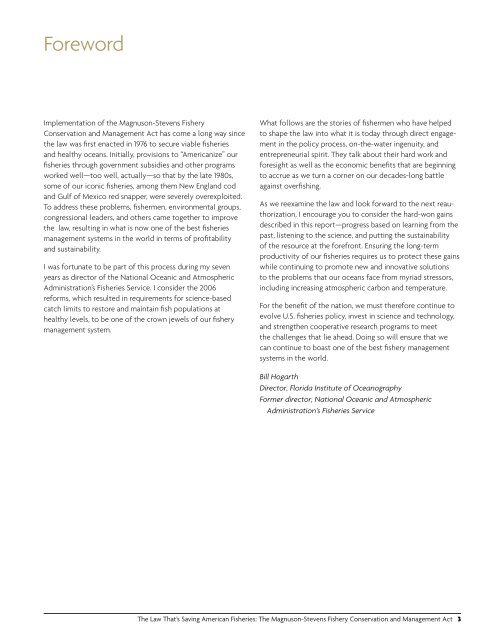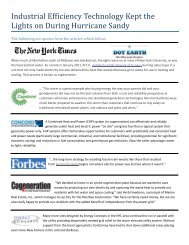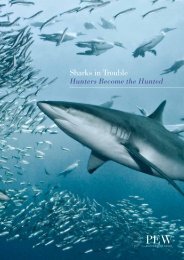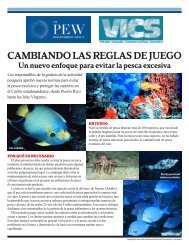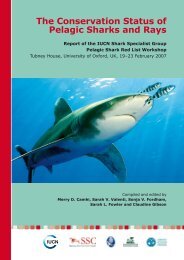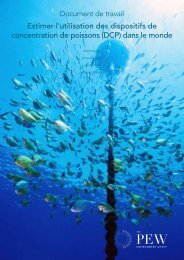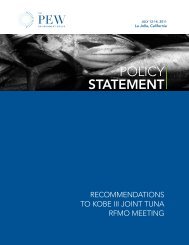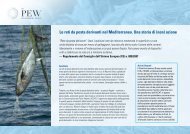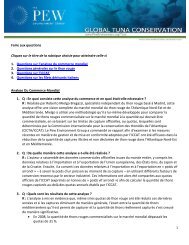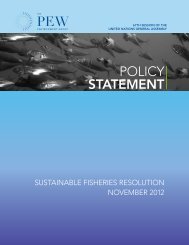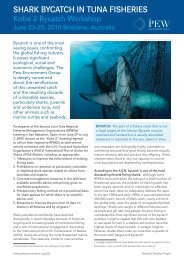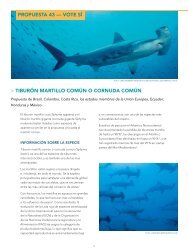The Law That's Saving American Fisheries - Ocean Conservancy
The Law That's Saving American Fisheries - Ocean Conservancy
The Law That's Saving American Fisheries - Ocean Conservancy
Create successful ePaper yourself
Turn your PDF publications into a flip-book with our unique Google optimized e-Paper software.
Foreword<br />
Implementation of the Magnuson-Stevens Fishery<br />
Conservation and Management Act has come a long way since<br />
the law was first enacted in 1976 to secure viable fisheries<br />
and healthy oceans. Initially, provisions to “<strong>American</strong>ize” our<br />
fisheries through government subsidies and other programs<br />
worked well—too well, actually—so that by the late 1980s,<br />
some of our iconic fisheries, among them New England cod<br />
and Gulf of Mexico red snapper, were severely overexploited.<br />
To address these problems, fishermen, environmental groups,<br />
congressional leaders, and others came together to improve<br />
the law, resulting in what is now one of the best fisheries<br />
management systems in the world in terms of profitability<br />
and sustainability.<br />
I was fortunate to be part of this process during my seven<br />
years as director of the National <strong>Ocean</strong>ic and Atmospheric<br />
Administration’s <strong>Fisheries</strong> Service. I consider the 2006<br />
reforms, which resulted in requirements for science-based<br />
catch limits to restore and maintain fish populations at<br />
healthy levels, to be one of the crown jewels of our fishery<br />
management system.<br />
What follows are the stories of fishermen who have helped<br />
to shape the law into what it is today through direct engagement<br />
in the policy process, on-the-water ingenuity, and<br />
entrepreneurial spirit. <strong>The</strong>y talk about their hard work and<br />
foresight as well as the economic benefits that are beginning<br />
to accrue as we turn a corner on our decades-long battle<br />
against overfishing.<br />
As we reexamine the law and look forward to the next reauthorization,<br />
I encourage you to consider the hard-won gains<br />
described in this report—progress based on learning from the<br />
past, listening to the science, and putting the sustainability<br />
of the resource at the forefront. Ensuring the long-term<br />
productivity of our fisheries requires us to protect these gains<br />
while continuing to promote new and innovative solutions<br />
to the problems that our oceans face from myriad stressors,<br />
including increasing atmospheric carbon and temperature.<br />
For the benefit of the nation, we must therefore continue to<br />
evolve U.S. fisheries policy, invest in science and technology,<br />
and strengthen cooperative research programs to meet<br />
the challenges that lie ahead. Doing so will ensure that we<br />
can continue to boast one of the best fishery management<br />
systems in the world.<br />
Bill Hogarth<br />
Director, Florida Institute of <strong>Ocean</strong>ography<br />
Former director, National <strong>Ocean</strong>ic and Atmospheric<br />
Administration’s <strong>Fisheries</strong> Service<br />
<strong>The</strong> <strong>Law</strong> That’s <strong>Saving</strong> <strong>American</strong> <strong>Fisheries</strong>: <strong>The</strong> Magnuson-Stevens Fishery Conservation and Management Act 3


